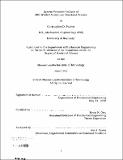System variation analysis of MIG welded aluminum structural frames
Author(s)
Painter, Christopher D. (Christopher Donald), 1972-
DownloadFull printable version (5.177Mb)
Advisor
Kevin N. Otto.
Terms of use
Metadata
Show full item recordAbstract
Variation reduction techniques are developed which explore an entire system for improved quality, rather than a single manufacturing operation. This system-level modeling approach is explored with an example of a complex assembly of aluminum extrusions and castings welded into a structural frame. By making use of modeling techniques such as Finite Element Analysis (FEA) and Design of Experiments (DOE), it can be shown how this method can also be applied to systems that include complex processes such as welding. Modeling the entire system of manufacturing operations allows key sources of variation and difficult output quality characteristics to be identified. In addition, intermediate tolerances can be determined in relation to the final required output tolerances. Determining intermediate tolerances is a two step process. First, a system of block diagrams are created to clearly outline ho-v1· variation propagates forward through the system. These block diagram representations are linearized models that map the transformations between the input variations and the output variations of a particular manufacturing operation. Secondly, using the combined transformation matrix of the system, intermediate tolerances, at a particular manufacturing operation can be determined by back-propagating final output tolerances. This provides a means by which design tolerances on the final product can be used in determining the allowable tolerances on Work-In-Progress (WIP) at intermediate manufacturing processes.
Description
Thesis (S.M.)--Massachusetts Institute of Technology, Dept. of Mechanical Engineering, 1998. Includes bibliographical references (leaves 73-75).
Date issued
1998Department
Massachusetts Institute of Technology. Department of Mechanical EngineeringPublisher
Massachusetts Institute of Technology
Keywords
Mechanical Engineering